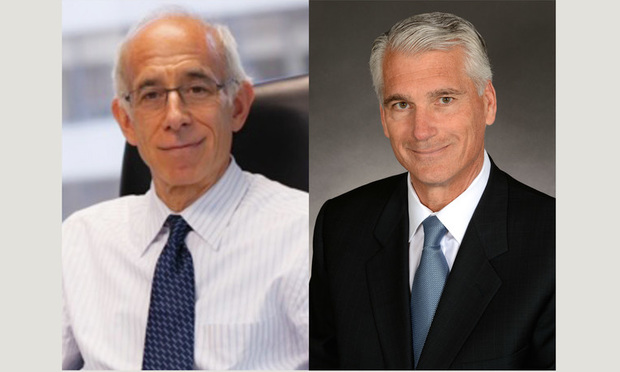Are Megaverdicts Changing How General Counsel Think About Litigation?
Some former in-house counsel said they believe juries are becoming more unpredictable, and that is changing companies' risk assessment.
October 16, 2019 at 01:52 PM
7 minute read
 Noah J. Hanft (left) and Mark LeHocky.
Noah J. Hanft (left) and Mark LeHocky.
Are a recent string of massive jury awards affecting how corporate general counsel approach litigation?
Awards such as the $8 billion verdict against Johnson & Johnson for Risperdal—which will be appealed, the company said—and the $2 billion Bayer AG/Monsanto Roundup weed killer verdict, later reduced to $86.7 million, have grabbed headlines, and unexpectedly large awards for injuries sustained in trucking accidents and the like also have made news recently.
In June, the board of directors of Bayer, maker of Roundup, which also plans to appeal the big California verdict, established a new supervisory board committee to monitor current litigation including trial and mediation activities, consult with the management board, and make recommendations on litigation strategy. The company also retained products liability litigation expert John Beisner, partner and leader of the mass tort litigation group at Skadden, Arps, Slate, Meagher & Flom, to advise the supervisory board on glyphosate (Roundup) litigation, according to the company's half-year financial report released in July. An email to Bayer for comment didn't receive a response by deadline.
An email to Johnson & Johnson for comment also didn't receive a response, but a company spokesman was quoted in Bloomberg News on Monday saying the company must be "willing to go to trial when the science, facts and law are on our side," but also "remain open to resolving cases through settlement when and where that's appropriate," according to the article.
Some former in-house counsel said they believe juries are becoming more unpredictable, and that is changing how companies assess risks around litigation. They said the possibility of paying out stunning sums in so-called nuclear verdicts or megaverdicts—sometimes defined as awards of $10 million and up—has magnified the downside potential of a trial loss, causing more companies to consider alternatives. And one current general counsel said big verdicts are also prompting companies to put more data analysis and technology around their decision-making process as to which cases to settle and which to take to trial.
"Exposures are great, juries are unpredictable and there is anti-business sentiment out there. Juries have become more comfortable with throwing out massive numbers," said Noah Hanft, a former general counsel of MasterCard Worldwide in an interview. Hanft is now an arbitrator, mediator and dispute resolution adviser at AcumenADR in New York, where he consults with companies on settlement strategies.
Mark LeHocky, a former litigator who is a mediator for ADR Services Inc., agreed. He spent 12 years as general counsel at Dreyer's Grand Ice Cream Inc./Nestle S.A. and Ross Stores Inc.
"All of these headlines get people's attention in the corporate executive suite and the general counsel's office. We are all seeing bigger and bigger numbers and that may be normalizing the idea of these really large verdicts," he said. "It is cycling on itself. We hear more about it, and the juries become more comfortable, and the risk calculation is going up for any GC in assessing those risks."
Tom Lavelle, a law lecturer at Santa Clara University School of Law, who spent 15 years as general counsel in high-tech companies, said even though most huge verdicts are reduced on appeal, they still pose risks from knock-on effects for companies.
"The GC must confront the consequences of res judicata and collateral estoppel where there are multiple plaintiffs filing cases around the country. Because a loss on the facts in any one of those cases may end up affecting the outcomes in all future cases by the other plaintiffs, the GC needs to balance the risk of settling where she or he believes the company is 'right,' with the consequences of a chain of losses triggered by a finding of fact by one jury," Lavelle said in an email exchange.
Adding to the uncertainty: Litigation financing, a relatively new phenomenon that may be making it easier for some plaintiffs to dig in for the long haul, whereas previously big companies may have had the advantage in protracted litigation, the attorneys said.
"It may have been that corporations could have in the past taken on a war of attrition but now maybe both sides have the ability to take on a war of attrition, so I would think it is a factor, based on instinct, not on data," Hanft said.
Oscar Romero, general counsel at Veristor Systems and former senior counsel and division general counsel for Bridgestone/Firestone, the automotive parts company, said defendant corporations also are using litigation financing and tapping their sophisticated data analysis capabilities.
"These litigation funding companies do a great job at that, and if you can't find one that is interested in your case, you may want to think long and hard. If they are turning you away they probably know something you don't," he said.
More Counsel Consider Alternatives, Use Technology
The growing recognition of the potential downside of a jury trial is causing more general counsel to consider alternative dispute resolution including mediation and arbitration, the lawyers said.
"I would say there are a growing number of GCs that have that mindset, it might even be a majority, but there is a fast-growing acceptance of getting ahead of these disputes and mediating," Hanft said.
Huge potential verdicts could prompt companies to assess their overall risk assessment systems, LeHocky said, including internal controls.
"Huge liabilities could cause seismic changes in companies in terms of how they assess and manage their risks," he said. "I know of examples of that happening where companies have had a major problem and it causes them to reflect on whether they are managing risk correctly and I suspect they are having those discussions.''
And more GCs are also tapping technology and data analysis around litigation decision-making as to whether to go to trial or settle, and which counsel to use.
"What is changing more rapidly is how cases are being assessed and how outside counsel are being selected," Romero said. "There are more and more legal technology companies that [are] helping organizations make the right decision," he said, naming companies such as LexPredict, CaseMetrix (a motor vehicle verdict and settlement database), and others.
"For these larger, high-risk lawsuits that would attract even the largest companies' attention, I see the risks mitigated through data analytics," he said. "You have been able to find out which courthouses are more plaintiff-friendly, and there are more analytics that drill down to the judge, the types of claims and how people select their outside counsel. It is no longer relationship-driven, but who can most successfully handle this matter in this courthouse in front of this judge. Many insurance companies have been using this for a long time to put the value of cases in alignment with their litigation strategy, and it is becoming more popular and more prevalent." Romero said some insurance companies are even implementing game logic to decide whether to submit for summary judgment or a motion to dismiss a case, for example.
"The one thing that I like to tell my clients/business colleagues is that if we reject an opportunity to settle the matter, will we regret it in six months and can you live with it?" Romero said. "I allow them to answer those questions and then support the decision that they make. You cannot second-guess yourself in these scenarios. You can do that on a post-action review so you learn all that you can from these experiences."
This content has been archived. It is available through our partners, LexisNexis® and Bloomberg Law.
To view this content, please continue to their sites.
Not a Lexis Subscriber?
Subscribe Now
Not a Bloomberg Law Subscriber?
Subscribe Now
NOT FOR REPRINT
© 2025 ALM Global, LLC, All Rights Reserved. Request academic re-use from www.copyright.com. All other uses, submit a request to [email protected]. For more information visit Asset & Logo Licensing.
You Might Like
View All
'True Leadership Is About Putting Others First': 2024 In-House Award Winners Inspired, Took Road Less Traveled


Datasite's Ethics and Compliance Team Drives Transformation
Trending Stories
- 1Paul Hastings, Recruiting From Davis Polk, Continues Finance Practice Build
- 2Chancery: Common Stock Worthless in 'Jacobson v. Akademos' and Transaction Was Entirely Fair
- 3'We Neither Like Nor Dislike the Fifth Circuit'
- 4Local Boutique Expands Significantly, Hiring Litigator Who Won $63M Verdict Against City of Miami Commissioner
- 5Senior Associates' Billing Rates See The Biggest Jump
Who Got The Work
J. Brugh Lower of Gibbons has entered an appearance for industrial equipment supplier Devco Corporation in a pending trademark infringement lawsuit. The suit, accusing the defendant of selling knock-off Graco products, was filed Dec. 18 in New Jersey District Court by Rivkin Radler on behalf of Graco Inc. and Graco Minnesota. The case, assigned to U.S. District Judge Zahid N. Quraishi, is 3:24-cv-11294, Graco Inc. et al v. Devco Corporation.
Who Got The Work
Rebecca Maller-Stein and Kent A. Yalowitz of Arnold & Porter Kaye Scholer have entered their appearances for Hanaco Venture Capital and its executives, Lior Prosor and David Frankel, in a pending securities lawsuit. The action, filed on Dec. 24 in New York Southern District Court by Zell, Aron & Co. on behalf of Goldeneye Advisors, accuses the defendants of negligently and fraudulently managing the plaintiff's $1 million investment. The case, assigned to U.S. District Judge Vernon S. Broderick, is 1:24-cv-09918, Goldeneye Advisors, LLC v. Hanaco Venture Capital, Ltd. et al.
Who Got The Work
Attorneys from A&O Shearman has stepped in as defense counsel for Toronto-Dominion Bank and other defendants in a pending securities class action. The suit, filed Dec. 11 in New York Southern District Court by Bleichmar Fonti & Auld, accuses the defendants of concealing the bank's 'pervasive' deficiencies in regards to its compliance with the Bank Secrecy Act and the quality of its anti-money laundering controls. The case, assigned to U.S. District Judge Arun Subramanian, is 1:24-cv-09445, Gonzalez v. The Toronto-Dominion Bank et al.
Who Got The Work
Crown Castle International, a Pennsylvania company providing shared communications infrastructure, has turned to Luke D. Wolf of Gordon Rees Scully Mansukhani to fend off a pending breach-of-contract lawsuit. The court action, filed Nov. 25 in Michigan Eastern District Court by Hooper Hathaway PC on behalf of The Town Residences LLC, accuses Crown Castle of failing to transfer approximately $30,000 in utility payments from T-Mobile in breach of a roof-top lease and assignment agreement. The case, assigned to U.S. District Judge Susan K. Declercq, is 2:24-cv-13131, The Town Residences LLC v. T-Mobile US, Inc. et al.
Who Got The Work
Wilfred P. Coronato and Daniel M. Schwartz of McCarter & English have stepped in as defense counsel to Electrolux Home Products Inc. in a pending product liability lawsuit. The court action, filed Nov. 26 in New York Eastern District Court by Poulos Lopiccolo PC and Nagel Rice LLP on behalf of David Stern, alleges that the defendant's refrigerators’ drawers and shelving repeatedly break and fall apart within months after purchase. The case, assigned to U.S. District Judge Joan M. Azrack, is 2:24-cv-08204, Stern v. Electrolux Home Products, Inc.
Featured Firms
Law Offices of Gary Martin Hays & Associates, P.C.
(470) 294-1674
Law Offices of Mark E. Salomone
(857) 444-6468
Smith & Hassler
(713) 739-1250







